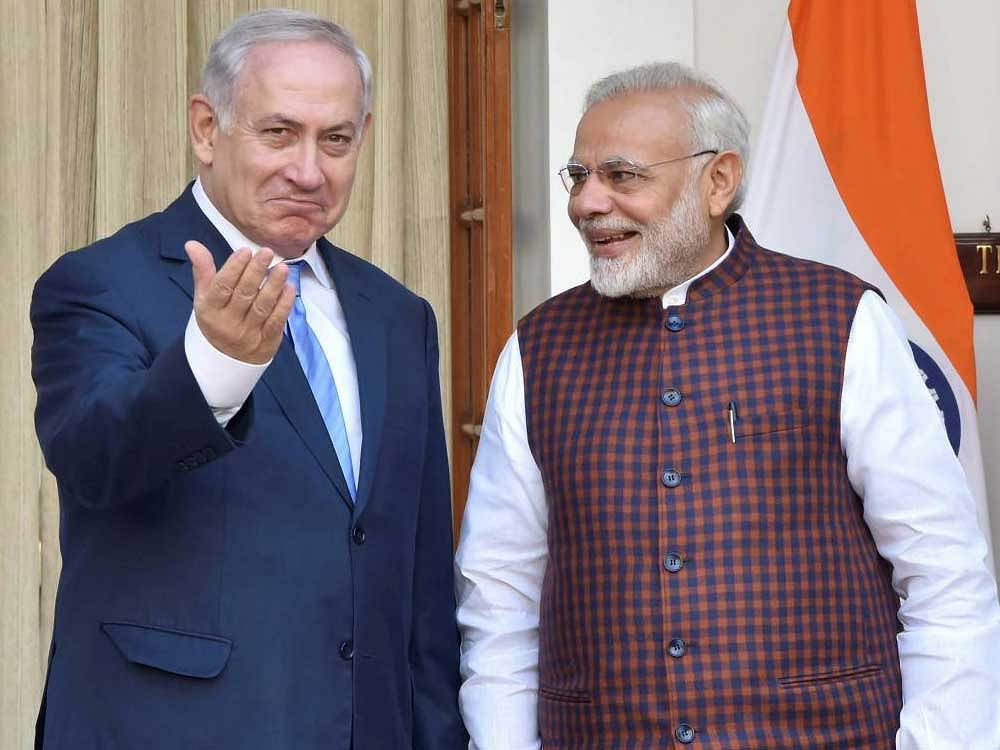
Prime Minister Narendra Modi on Monday called upon Israeli companies to manufacture more military hardware in India as the two nations inked nine pacts.
Israel Prime Minister Benjamin Netanyahu nudged Modi to restart the negotiation on the proposed India-Israel Free Trade Agreement.
The Ministry of Commerce will now send a delegation to Israel next month to discuss the issue with the officials of the West Asian nation.
The nine deals signed after the two prime ministers met at the Hyderabad House in New Delhi includes two for bilateral cooperation in cybersecurity and the hydrocarbon sector.
Israel offered cutting-edge technology to help revolutionise agriculture in India with the use of big data, ground sensors and drones.
Modi and Netanyahu also agreed to deepen cooperation in innovation, business and trade, space, counter-terrorism and homeland security, higher education and research, science and technology, and tourism and culture.
Modi later told media persons that he had called upon the defence companies of Israel to set-up joint ventures with firms in India and manufacture more in the country, taking advantage of the Foreign Direct Investment regime, which his government had liberalised.
Netanyahu also said that he had discussed issues related to "cooperation in defence" so that the two governments could keep people of their nations "safe and secure".
The prime ministers, however, did not comment on India's recent decision to cancel the Rs 3,200 crore ($ 500 million) tender (Request for Proposal) to procure 1600 Spike anti-tank guided missiles from Israel's Rafael Advanced Defence Systems, a state-owned entity.
Secretary (Economic Relations) Vijay Gokhale later told media persons that the two prime ministers did not go into the specifics of the issue.
Sources, however, told DH that both sides explored possibilities of a government-to-government deal for India to procure a lesser number of anti-tank missiles from Israel.
A joint statement issued after the meeting noted that it was important to set the direction for developing more business models and partnerships for the joint ventures and joint manufacturing, including the transfer of technology as well as joint research and development in defence and security.
The prime ministers have asked the defence ministries of both the governments to hold discussions this year with the active involvement of public and private sectors to create the basis for a viable, sustainable and long-term cooperation in the defence industry.
Modi and Netanyahu recognised the "grave threat" that terrorism posed to peace and security, "including from non-state actors".
There could be no justification for acts of terror on any grounds whatsoever, Modi and Netanyahu noted and advocated "strong measures" not only against terrorists and terror organisations but also against "those who sponsored, encouraged or financed terrorism or provide sanctuary to terrorists and terror groups".
The Memorandum of Intent between Invest India and Invest in Israel will facilitate the exchange of information on investment opportunities, relevant laws and regulations, policies and government initiatives.
The MoU on cybersecurity cooperation will set the stage for collaboration in skill development and exchange of information.
The MoU on cooperation in hydrocarbons is intended to promote collaboration in upstream sectors, research and development in future technologies and startups in oil and gas sector.
Israel has been offering India partnership in production from its new-found natural gas reserves in the Mediterranean Sea as well as for sale of the produce.
